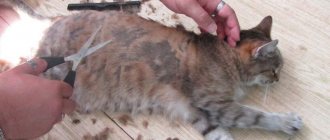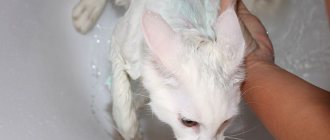If a cat tries to find sexual partners after sterilization and shows signs of estrus, you should immediately take your pet to the veterinarian. Atypical behavior may be the result of a poorly performed operation or serious illnesses caused by disruption of the endocrine glands. Treatment at home without visiting a veterinary clinic is impossible.
What can explain sexual desire after surgery?
Many cat owners decide to undergo a similar procedure for obvious reasons. Firstly, the sexual activity of animals is accompanied by loud screams that disturb the peace and sleep of the owners. Secondly, not all people enjoy the good emotions associated with the birth of babies. Having decided to undergo surgical intervention, many owners ask the question: “Does it happen that a cat asks for a cat after sterilization?” Unfortunately, such a situation is very likely. This happens for a number of reasons, the most common of which are:
- Poor quality of surgical intervention.
- Hormonal imbalances.
- Features of the development of the gonads.
Signs of sexual activity are usually present in females who have undergone surgery in adulthood. Symptoms are evidence of changes in hormone balance. Some time after surgery, behavior characteristic of the estrus period is observed. Watching their pet, the owners begin to understand that the cat, after sterilization, asks for a cat.
In principle, there is nothing “supernatural” about this. The reason is the same why unsterilized pets are “thirsty” for cats: hormones. In vain, many owners who have nothing to do with veterinary medicine believe that after sterilization, these substances disappear from the animal’s body instantly.
This is impossible for purely physiological reasons:
- Partial hormones always remain in the pet’s blood and plasma, and the “blood” reserves can last for a long time. For some cats, the process of hatching lasts for several months.
- In addition, hormones accumulate intensively in subcutaneous tissue and other fat reserves in the cat’s body. The more well-fed the pet was at the time of sterilization, the longer it will show “echoes” of typical sexual behavior. There are cases when a cat, which was operated on a year ago, begins to scream from time to time, clearly demanding the presence of the cat. This doesn’t happen too often, but this phenomenon is also not unique.
Of course, residual hormones are an important, but still not the only predisposing factor in the “strange” behavior of operated cats.
There are other reasons, although they are not too varied:
- Rarely, a kind of “replacement of functions” occurs in the body of the operated animal. The adrenal glands and other glands of a sterilized cat can also produce sex hormones. Even though the volumes of their synthesis are not so large, this amount is quite enough for the cat to start screaming and demanding “male attention.” True, in practice this phenomenon actually occurs infrequently, and the reserves of such hormones dry up relatively quickly. There simply aren’t enough of them for anything “serious.”
- An “exotic” case – during a carelessly performed operation, an ovary may remain in the animal’s body. Sometimes, during sterilization, the ovaries are deliberately left altogether, only the uterus being removed. Note that in the case of deprivation of old animals, this is completely justified, since the sudden deprivation of their body of sources of hormones is too much stress, the consequences of which are difficult to predict.
Finally, some veterinarians and zoologists believe that animals are guided only by instincts. Recent research shows that these animals are individuals in the full sense of the word, and therefore they are not alien to habits, including those that may seem strange to us.
Simply put, screams that seem to indicate the cat’s desire, in fact, may simply be a “habit”, an echo of the cat’s usual behavior. You should not pay attention to this: over time, the pet will get used to the new role, calm down, and the screaming will stop by itself.
When, after sterilization, the pet continues to ask for a cat, the following behavioral characteristics are observed:
- From time to time the animal seems to “wakes up” and begins to meow hoarsely, “invitingly”.
- Periods of sexual arousal in sterilized cats do not last long, ending suddenly just as they began.
- Another thing is much more unpleasant. The problem is that a sterilized cat often marks its territory, despite its “inferiority.” Alas, this habit remains with the pet for a long time, sometimes for the rest of its life.
We suggest you read: Microsporia in cats: treatment, symptoms, treatment at home Of course, you shouldn’t hope for its complete disappearance, but still, the stable amber gradually disappears (in about six months, sometimes it takes longer).
Laparoscopic sterilization during a leak
Not too new, but still a progressive method of de-fertilizing animals. Currently, they are resorting to it more and more often.
Technique
The essence of the technique is that the operation is performed through a small incision in the abdominal wall. To perform sterilization, a flexible probe with a camera is used. The pain reaction in this case is minimal, and therefore in some cases it is possible to do without general anesthesia (but this is still not recommended).
This method is ideal for depriving animals in heat. Please note that laparoscopic sterilization cannot be used during pregnancy. In addition, with this technique, infertility can be performed only in two ways:
- The ovaries are removed.
- Fallopian tube ligation is performed.
For surgical excision of both the ovaries and the uterus itself, conventional sterilization should be used.
Features of the rehabilitation period
The huge advantage of this type of sterilization is its low invasiveness. However, to protect the seams in this case, it is recommended that the cat wear a protective blanket for at least a week. But still, after laparoscopic sterilization, the real need for this rarely arises.
The seam after it is no more than a centimeter long, and therefore it can easily be closed with a small piece of plaster and a cotton-gauze swab. If it does cause any discomfort to the cat, it is recommended to prescribe antihistamines and sedatives.
Unlike conventional sterilization, laparoscopic sterilization virtually eliminates the risk of postoperative sutures coming apart. Already on the second day the cat is allowed to play, you do not have to limit its physical activity.
But when caring for an operated pet, you need to take into account some features:
You will most likely have to wait until the end of the procedure at the clinic. In this case, the operation takes place quickly, the cat must be taken away immediately.
Despite the quick recovery from anesthesia, your pet will not immediately return to normal. Don't be surprised if you see a wobbly gait or discover some strange behavior in the animal.
As a rule, all oddities completely disappear after about a couple of hours from the end of the operation. At the same time, you need to provide your pet with unlimited access to clean drinking water, as the cat will be tormented by severe thirst.
New family member
The young owners of a luxurious Persian cat gave birth to a child. The pet always had a calm and kind disposition, was not problematic and visited her litter box regularly. And then they replaced her: she hides in all corners, she began to be capricious in her diet, and the worst thing is that the cat marks all the corners, including the children's room.
What should owners do in this situation? First of all, you need to know that this behavior is the pet’s reaction to the baby, oddly enough. Cats have difficulty withstanding any change of environment and the appearance of new faces on their territory. Over time, this behavior will pass. In this situation, all that remains is to punish the prankster by catching her at the crime scene.
We suggest you read: When is the best time to sterilize a cat? Age and optimal period
Signs that a cat is wandering
A cat in heat causes a lot of trouble to its owners. The average duration of a cat's heat is 5-7 days.
There are also temperamental individuals that can walk for 10-14 days every month. The first time a cat begins to ask for a male cat is at the age of 6 months, but this is too early for mating. The characteristic symptoms of estrus are immediately noticeable:
- friction of the pet against objects - often, for a long time;
- loud screams with inviting notes, often at night;
- more affectionate behavior with the owner and others;
- refusal of food (the cat may not even eat its favorite treats);
- frequent urination, especially if there is a cat nearby;
- when stroking the tail area, the animal protrudes its back part, twitches its tail, and bends its paws;
- clear fluid is discharged from the vagina.
Symptoms may vary between individuals. There are animals that walk almost unnoticed, and the owner finds out about the heat after pregnancy. But more often the first signs are pronounced.
Increase or decrease in activity
There are animals that do not feel discomfort after surgery and continue to lead their usual lifestyle. Some cats become hyperactive. This behavior is highly undesirable at the recovery stage. We must prepare for such a turn of events in advance. You can add sedatives to the water.
It is recommended to prepare an isolated place for your pet, where she will be calm and comfortable.
Decreased activity is normal after surgery. The animal does not need to be disturbed. Some owners lift it and carry it - this cannot be done.
Calm a cat at home
Experienced owners offer the following options for solving the problem of sexual hunting:
- lock the animal in a separate room (but this is not always suitable; often the cat experiences even more stress);
- during the period of activity, put the animal under water (preferably warm) for several minutes;
- distract your pet by playing: during the period of sexual activity, the cat experiences an excess of energy, which in nature it spends on searching for the cat and mating.
Be sure to read: Heat in cats: how long does it last and how often does it happen, at what age, how to recognize it, how the process proceeds
These methods help if one or two heats need to be missed, and in the future the cat is going to be mated with a male.
Herbal therapy is considered gentle and quite effective.
To calm a walking pet, people use:
- lemon balm;
- chamomile;
- mint;
- motherwort.
A decoction of these herbs, individually or as a complex, is given to the animal twice a day. These methods are considered the safest because they do not contain hormones. Hence the short duration of the impact.
If the offspring are not needed at all, then it is better to sterilize the animal. If the animal is active and folk remedies do not help, veterinary drugs are used.
They can act in different ways: change the animal’s hormonal levels, or simply have a calming effect. The form of release of such medications is very diverse: tablets, injections, suspensions, decoctions and even drops. Many veterinary drugs have side effects, especially when taken chronically.
Before use, you must carefully read the instructions and consult your doctor.
To calm a pet during estrus, veterinary medicine offers various medications.
The most popular means are:
- Kot Bayun is a water infusion of soothing herbs. Available in drops in bottles of 10-16 ml. The product is safe, has a calming and analgesic effect.
- Fospasim is a homeopathic medicine in drops. Helps your pet survive stress. It is used not only for calming while searching for a cat, but also when moving, before exhibitions and for easily excitable animals.
- Stop-intim is a hormonal drug that is recommended for use if you do not plan to get offspring from your cat.
- Stop-stress - effective drops of domestic production. Contains calming plant extracts & phenibut. The daily dose is 1 drop per 1 kg of weight. Divide into 2 doses.
Be sure to read: Depo-Provera for cats: instructions for use, dosage, injections for walking
Hormonal medications provide high-quality results, but if the strict dosage is not followed, they are harmful to the pet’s health.
The main reasons for screaming at night
The heart-rending screams emitted by a cat at night not only disturb the sleep of the inhabitants of the home, but also become a cause of discord between neighbors. So how to stop a cat from yelling at night?
Silencing a pet is not an easy task. But first you need to understand the reasons for this behavior
Perhaps the cat, emitting heart-rending screams at night, is not just trying to attract the owner’s attention, but is signaling him about his problems, which require an immediate solution
First, you should understand that every cat is unique. Animals, like people, have their own personalities. Therefore, some of them can “talk” all day and night, while others will not be forced to meow even by an approaching dog. But if a cat yells at night, what to do is a question that worries every loving owner. So what are the reasons for the incessant screaming at night?
Hormones
To avoid problems with hormonal surges, cats and female cats must be spayed and neutered on time. Otherwise, your furry pet will regularly organize concerts not only during the day, but also at night. With cats things are even more complicated. They are capable of howling pitifully for months, becoming silent only while sleeping and eating.
There is only one way out - urgent surgery. Indeed, during the period of sexual heat, representatives of the cat family lose their appetite and sense of self-preservation. It's good if they are safe at home. What will happen if they manage to escape into the street?
Disease
What should you do if a sterilized cat screams at night? In this case, your pet needs to be taken to the vet immediately. Sterilized animals are susceptible to urolithiasis. Therefore, the cause of night concerts can be abdominal pain and difficulty urinating.
Nervous disorders are common in older animals. They can also cause heart-rending screams at night. It will no longer be possible to cure such a pet. But the doctor will definitely recommend medications that will help bring the animal into an adequate state.
Worm infestation
If your pet starts giving vocal concerts, you need to find out why the cat yells at night. Perhaps the reason for this is helminthic infestation. Many feline breeders mistakenly believe that a pet cannot pick up worms. And in vain...
Rodents and insects living in the apartment can become carriers of parasitic diseases. And the owners themselves often pamper their pets with raw fish or meat, which may contain parasites.
Anxiety
What to do if your cat yells at night? First of all, you need to make sure that everything is in order in the apartment. Animals are more sensitive, so they can anticipate trouble long before it occurs. Cats are able to warn their owner about a fire, gas leak or an approaching earthquake.
Demand for attention
Due to their nature, some furry pets are very jealous of their owners.
And if they stop paying attention to them, they scream heart-rendingly. In this case, you will have to either satisfy the pet’s desire and pet it, or continue to ignore the cat’s singing on principle.
What actions will help relieve anxiety?
What to do if a cat goes on a spree worries all owners. You can use various methods to relieve anxiety during this period. To increase efficiency, it is better to use them comprehensively.
- Limit contact with other animals in the house.
Such actions will help avoid conflicts, because a cat’s character changes for the worse during heat. She can show aggression towards other cats, dogs and small animals.
A closet or bathroom is suitable for insulation. There must be clean water there. It is recommended to give food before bedtime and several small portions during the day.
The cat becomes aggressive. It is necessary to lay softer bedding made from natural fabrics. The cat will appreciate the comfort and nervous tension will decrease somewhat.
- Keeping the tray clean.
Cats are particularly clean even during estrus. Due to increased irritability, an uncleaned litter box can cause a negative reaction and the cat will shit in another place.
- Keep your cat busy with games and entertainment.
Excessive activity and energy need to be directed in the right direction. To do this, purchase new toys, and she will be busy for several days. Having played enough all day, she will sleep soundly.
What should pet owners do?
In order for your pet to calm down, you need to consult a specialist to select therapy.
We invite you to read: Sterilization of cats during estrus, what dangers exist
Today in pharmacies there is a large selection of medicines based on medicinal plants that help cope with the problem. Based on the examination results, the veterinarian will recommend the correct remedy for the animal. Fortunately, these drugs do not cause serious side effects.
Most likely, just be patient. Gradually the cat will calm down, nothing bad will happen to it. But what you definitely can’t do is give your pet hormonal sedatives, like Sex Barrier and similar drugs. The problem is that their long-term use during the action of animal hormones remaining in the blood is a sure path to the development of cancer.
To make your cat calmer, you can take the following actions:
- It is necessary to consult a veterinarian. There are many natural herbal sedatives on the market today. A specialist, guided by the information obtained after examining the animal, will help you choose the most effective one. Such medications are safe and their use does not pose any consequences in the future.
- We recommend gradually reducing your caloric intake. The less excess energy there is in the animal’s body, the calmer it will be. In addition, with a balanced diet, the risk of gradual obesity of the sterilized animal goes away.
- During agitation, it is advisable to isolate the cat in a separate room. Minimizing stress is a good way to calm your pet without resorting to other methods (including medications).
Disease
The cat marks as if to spite its owner. They did everything to her: they scolded her, spanked her, and poked her nose. No, he doesn't understand. Runs away from the crime scene on half-bent legs, with blocked ears. But he continues to do his job.
Do not rush to scold your favorite. Perhaps the whole point is that the animal simply does not always have time to reach the tray. If a cat has cystitis or urolithiasis, punishment will not help. The animal must be treated; this is impossible to do at home. Therefore, you will have to take your pet, put it in a carrier and rush to the veterinarian. The faster, the better for everyone. Because only a specialist can determine the presence of diseases associated with the bladder.
How often does heat occur?
After giving birth, some pets ask for a cat within a month and a half
The first heat in cats occurs at the age of 6-7 months.
If the cat has already been in heat, then she walks once every three months. But an animal that didn’t have a cat walks more often. After giving birth, some pets ask for a cat within a month and a half.
The process of “spring” in a cat is divided into three periods:
- proestrus;
- estrus;
- metestrus.
The beginning of estrus is proestrus. This period lasts 4 days. Already at this time, the cat’s genitals secrete a clear liquid, the cat is not yet accepting the cat, but external signs of hunting are present.
The first symptom of approaching heat is increased tenderness towards the owner and others.
Duration is on average 7 days. The older the animal, the longer the hunting period lasts.
How to avoid the noise of a sterilized cat?
Even if a sterilized cat is walking again, it is necessary to immediately take certain measures so that a stable cycle does not establish. An effective measure is the introduction of hormonal drugs . In very rare cases, this procedure requires repeating. Note that if sterilization took place a few days ago or has reached a period of 7 months, and the sterilized female is still walking, an injection of a hormonal drug will definitely help. If sterilization was done a year ago, or even more, the pet is walking for a completely different reason.
To sterilize or not?
Sterilizing a cat is a cardinal method of solving a problem. Sterilizing a cat is a cardinal method of solving a problem.
Before you decide to have surgery, you need to think it over carefully. Doctors recommend that the procedure be carried out as early as possible for the health of the pet. A cat at a young age tolerates anesthesia more easily. But the owner must remember that the operation changes the pet’s body irrevocably. This means that if you want to get offspring, there will be no opportunity for this.
At the same time, long-term abstinence for a cat is severe stress, which, in addition to nervous disorders, also leads to diseases of the reproductive organs. An unsterilized cat often suffers from ovarian cysts, purulent inflammation of the uterus, hormonal disorders, and tumors of the mammary glands.
Professional veterinary specialists agree that if you do not want to produce offspring from a cat in the future, then it is better to sterilize the pet. This will relieve the animal from stress during the hunting period, and will bring relief to the owner.
Be sure to read:
How to distinguish a male kitten from a girl: a newborn, in the first days of life
Compared to other methods of controlling feline sexual activity, neutering has both advantages and disadvantages.
Advantages of sterilization:
- Solving the problem once and for all. This is actually a disadvantage too, since at one moment the owner may regret that the animal is not able to become pregnant.
- Efficiency 100%. Drops and tablets, even hormonal ones, may not work. It's very individual. The operation will give the desired result, without a doubt.
- The operation is safe. It is performed through a small incision on the side of the torso.
But the operation also has disadvantages:
- It takes time to recover. This is an abdominal operation that is performed under general anesthesia. After it, the cat may feel unwell for some time and be lethargic. The animal should not be fed for several hours before surgery.
- The operation costs money. Some owners find it cheaper to purchase drops or tablets once a month.
- Inability to obtain desired offspring in the future.
- Irreversible changes in the cat's body. Hormonal changes can cause your pet to become lethargic, less mobile, and have a tendency to gain weight. By organizing proper nutrition, the risks of disease are significantly reduced.
We invite you to read: Singapore cat - description of the breed from A to Z 120 photos. A complete description of the appearance and character of the Singapura cat
If your pet is fed prepared specialized food, then after sterilization you should purchase food for sterilized cats.
Why does a cat show interest in a cat after castration?
It is believed that after castration, a cat's interest in cats fades away within a few days and is never resumed. In the civilized world, it has long been customary to castrate cats that have no breeding value. However, sometimes it happens that after castration, a cat, to the great surprise of its owners, remains attracted to ladies of its own species.
The cat is clearly planning to do something with the kitty
There are many cases where cats that had been castrated for a long time again became gallant gentlemen when a fluffy person of the opposite sex appeared, or in the spring they behaved extremely depravedly with soft toys and the owner’s slippers.
The owners' reaction usually ranges from amazement to indignation at a poorly performed operation with claims against veterinarians.
However, whether such claims are justified is an ambiguous question.
Veterinarian's mistake
If the veterinarian kept silent about the fact that the cat, whom he supposedly castrated safely, is a cryptorchid and that the second testicle remained in the abdominal cavity, this is a veterinarian’s mistake.
It is impossible for a specialist not to notice this fact, and, most likely, he will have to perform abdominal surgery, at the expense of the institution (veterinary clinic).
Remember all
If the cat is an adult (over a year old) and has already had matings, then there is a possibility that he will never forget about this experience, and the corresponding aspects of behavior will be preserved.
After all, hormones are produced by the adrenal glands and the pituitary gland, and no veterinarian in his right mind would remove these organs from an animal to stop fertility.
However, it is impossible to predict such a development of events; not all cats are so temperamental, and most of them, after removal of the testes, forever lose interest in amorous affairs. And, if castration was carried out according to all the rules, then claims can only be addressed to nature itself.
Because, as already mentioned, it is impossible to stop the production of hormones by the pituitary gland and adrenal glands.
Chemical castration of a cat
If the owners chose chemical castration or vasectomy instead of a banal surgical solution to the problem, well, the risk is a noble cause, but they won’t have to drink champagne this time, since all other castration options, except the classic one, give half-hearted and unstable results.
In this case, they will only have to blame for their short-sightedness and misplaced pity. The solution may be to carry out full castration, but there may not be a 100% result.
Attenuation of sexual functions in a castrated cat
It is important to know that the attenuation of sexual functions in each cat occurs gradually and individually. This process can last for several months or even years, or it can end once and for all when the animal recovers from anesthesia.
A castrated cat climbs on a cat - consequences
A castrated cat can not only care for a cat, but also mount her, but sexual intercourse will occur without conceiving offspring.
He can't stop wanting a cat, but he can't become a father. However, there are isolated cases where a castrated cat managed to breed a cat in the first month after surgery, and kittens were born.
Perverted cats
An interesting fact: if there are two cats in the house, and both are neutered, then a “he-she” relationship is possible between them in cases where castration has no effect. Of course, there is nothing dangerous in such games, and there is no point in strictly suppressing them.
Stress factor
Your cat is sterilized and marks corners in the apartment. How is that? The indignation of the owners is understandable; it is simply impossible to tolerate the disgusting smell. Do you really have to get rid of the animal if nothing helps?
Wait. Let's try to understand the problem. Remember, was there a situation at home that could affect the cat? Maybe friends with a dog came to visit? Or did little guests come to the children who wanted to meet the beautiful purr? Or did your pet’s food suddenly change?
It would seem that these are very minor factors. This is real stress for you and me, but for the cat. Imagine, she lies there, not bothering anyone. And then a dog’s face came out of nowhere. And he smiles from the top of his dog’s mouth. Naturally, the cat’s eyes will widen, as they say, and it will start looking for the fifth corner in the apartment, just to escape from the monster. And then the body “discharges” in such a non-standard way as marking the territory. Because he was stressed.
We invite you to read: Review of nicknames for boys and girls for Scottish Fold cats
Should you let your cat outside?
Should your cat be allowed to roam outside from time to time, and if so, for how long? This is one of the very important questions, the answer to which every cat owner must find on their own. There are many pros and cons to consider on this topic, and these pros and cons will need to be weighed more than once before making a final decision.
The main argument of those who regularly let their pet out for a walk and consider it right is simple: cats are very independent natures, and on the street they feel freer, because their space and actions are not limited. Moreover, a cat on the street can also feel happy because:
Moreover, veterinarians believe that cats need walks because they can add variety to their daily lives.
This is very important, because boredom can subsequently become a catalyst for various deviations in the behavior of the animal, which can begin to scratch wallpaper or furniture, intensively lick fur, destroy indoor plants, etc.
This is why animals that are picked up on the street and brought into the house very often want to come back. And if a cat asks to go outside, it is better to either let it out or find something for it to do indoors. Otherwise, she will either be sad or throw out all her energy inside the house, which is sometimes dangerous for the integrity of the things located there.
Even if the cat asks to go outside too persistently, you should think carefully before opening the door for him. First of all, it is necessary to take into account that such a change will qualitatively change the pet’s life and will directly affect how and how long it will live. And with the wrong approach, you can significantly shorten the life of your pet!
walking, the cat is inevitable
Source
Causes related to hormone production
The body of any animal produces substances that regulate sexual behavior.
Many owners mistakenly believe that after the operation, sexual activity stops. The fact is that a certain amount of hormones remains in the pet’s blood and subcutaneous tissue for some time. Due to the effects of these substances, the cat asks for a male cat after sterilization.
The more adipose tissue the pet had at the time of surgery, the longer the signs of heat persist. There are cases when the female continued to scream throughout the year, demanding a male. Sometimes this phenomenon is explained by the presence of hormones in the tissues of the adrenal glands. Fortunately, the amount of these substances quickly dries up and sexual activity stops.
Other tips
If after sterilization the cat begins to demand a cat, it is necessary to reduce the calorie content of its diet.
Eating nutritious food helps increase sexual performance. In addition, the operated pet is in great danger of gaining excess weight. To prevent the development of obesity, you should reduce portions of foods. The answer to the question of whether a cat can ask for a cat after sterilization is certainly positive. Sometimes owners have to give the animal drugs to stop sexual activity. However, in some cases, avoiding stress can help eliminate the symptoms of sexual desire without medication. It is better to place the female in a separate room. This will allow the animal to calm down.
Features of animal behavior
Sexual heat is accompanied by a change in the character of the pet. If a cat asks for a male after sterilization, her need for mating manifests itself as follows:
- The animal begins to meow loudly and hoarsely.
- The female suddenly becomes restless.
- She's marking her territory.
Sometimes this behavior persists in the pet for the rest of its life, despite surgical intervention. Fortunately, the discharge of sterilized animals does not have a pronounced odor.
It should be borne in mind that the level of hormones in the blood of females is affected by the work of not only the reproductive glands, but also the adrenal glands, as well as the pituitary gland and hypothalamus. And after surgery, these organs can produce substances that provoke sexual activity. This situation often indicates the presence of tumors. As therapy, veterinarians prescribe medications and special capsules that are injected under the skin.
What other cases are there?
In veterinary practice, there are a number of specific cases when the sex hormonal background of a sterilized individual was determined by diseases occurring in the thyroid gland. Aligning and adjusting the balance of hormones in this situation is not an easy task, which may include a number of stages:
- Exclusion of hormone-producing tumors;
- Chemical suppression of sex hormones.
Most often, the latter is performed by implanting a special capsule under the skin.
Incorrectly performed operation
One of the explanations for why a cat asks for a cat after sterilization is a specialist error during surgery. This happens when the gonad or its fragment remains in the abdominal cavity. If such a violation is detected, the procedure must be repeated.
In this case, surgery using a laparoscope is not used, since it will not give the desired result. Owners should monitor the animal after this event and be aware of signs of sexual activity in a cat after sterilization. The photo clearly shows how the animal behaves.
How do cats behave day by day after sterilization?
The general condition and behavior of the cat after sterilization changes daily.
Day 1
On the first day after surgery, the cat has no appetite, lethargy, drowsiness, coordination of movements is impaired, hallucinations and disorientation may occur - the pet tries to run or crawl in an unknown direction, stops abruptly, runs into walls, falls and falls asleep, jumps up, etc. This behavior is normal and there is no reason to worry.
The cat may not blink, in which case it is necessary to close her eyes yourself until she starts blinking again, otherwise there is a risk of drying out the cornea.
In addition, involuntary urination and vomiting are possible.
On the first day after sterilization, you need to be close to your pet and monitor its condition. You cannot feed the animal, but only give it water from a syringe or pipette.
Day 2
During the second day, the cat begins to come to its senses, its behavior becomes more adequate. The pet has a desire to hide in dark, hard-to-reach places, so it is necessary to monitor it and constantly keep it in sight.
If a cat is in pain, it may try to bite someone who tries to touch it.
At this time, the animal shows a desire to lick the area near the incision and reacts too excitedly to all extraneous sounds.
On the second day, you can put water near the animal and start feeding it in small portions.
Day 3
On the third day, the cat fully comes to her senses: she is active, reacts with interest to what is happening around her, goes to the litter box and begins to ask for food.
You need to measure your pet’s body temperature twice and, if the readings are elevated or decreased, contact your veterinarian.
Due to the fact that anesthesia can slow down intestinal motility, it is necessary to monitor the regularity of bowel movements and, in the absence of bowel movements, you can give the cat mild laxatives.
Day 4
On the third day after sterilization, the cat should eat and drink independently, and should actively urinate and defecate.
Day 5
On the fifth day, the swelling and redness near the suture subsides, and scarring begins.
The cat is becoming more and more active and can now walk around the apartment.
And if before the operation the pet had access to the street, then into the yard, you can jump on low surfaces.
Day 6 and 7
By this time, the pet’s activity and appetite are completely restored, pain completely disappears, urination and bowel movements occur as usual.
Let's summarize
https://www.youtube.com/watch?v=ytpolicyandsafetyen-GB
We talked about why a cat marks. Main conclusions of the article:
- The reasons for this phenomenon are different. These include: bladder problems, estrus, stress, change of environment, the arrival of a new family member.
- How to deal with hooliganism? First of all, find out the reason, and if it is not associated with diseases, then there are several options: sterilizing the cat, cleaning with special products that wean the pet off from marking, cleaning the area using available disinfectants. They kill the smell and repel the cat with their own scent.











